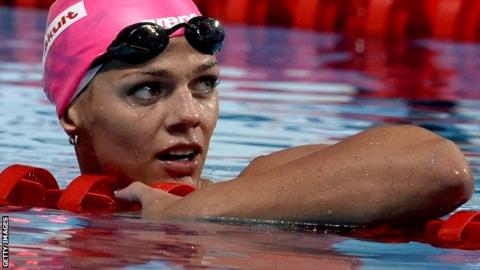
Swimming is “not a clean sport” and needs an athletics-style investigation to ensure fair racing at Rio 2016, according to a leading coach.
Briton Jon Rudd guided Plymouth-based Lithuanian Ruta Meilutyte to Olympic gold at London 2012.
Meilutyte’s main rival, Yuliya Efimova, faces a possible lifetime ban after testing positive for a banned substance for the second time in her career.
“There’s no doubt in my mind, we’re not a clean sport,” Rudd told BBC Sport.
“It was a shock the first time Yuliya tested positive and it’s disappointing a talented athlete has chosen this route to try and achieve her ambitions.”
Russian world champion Efimova is just one high-profile example of a much bigger problem for Russian sport.
From the beginning of 2010 to the end of 2015 a total of 27 swimmers tested positive for banned substances and served bans.
In November last year the IAAF – athletics’ world governing body – voted to suspend Russia’s athletics federation (Araf) after the publication of an independent World Anti-Doping Agency report that alleged “state-sponsored doping”.
Although that volume of evidence has not been presented against the Russian Swimming Federation, Rudd believes swimming’s own governing body, Fina, needs to begin a global investigation immediately.
“At the moment there are lots of question marks about several nations so let’s open it up and let’s see the nuts and bolts of swimming,” he said.
“If we were to have the level of scrutiny and investigation in swimming that we’ve seen in athletics, then the only people who would be against it would be those who have something to hide.
“Fina have to be behind that and they have to be strong or they lose credibility and respect.”
Fina insists it is doing everything in its power to identify and punish drugs cheats and does not feel a large-scale independent investigation is required.
“I think there is a problem, but in swimming it is not a big problem,” Fina executive director Cornel Marculescu told BBC Sport.
“People say ‘now it’s your turn’, but we are doing everything we can and have nothing to hide.
“This is a battle we will not win but we will fight and fight – no matter what the level of athlete or the nation they come from.”
Rudd, who was England Swimming’s head coach for the highly successful Glasgow 2014 Commonwealth Games, hopes Efimova is given the correct punishment.
“When Efimova was first proved positive the rules were not adhered to and they were manoeuvred and manipulated for whatever reason,” said the Plymouth-based coach.
“For us all to believe in our governing body they need to stand up to the views they said that they hold – it’s a cut-and-dried rule [a lifetime ban for a second offence].”
Rudd concluded: “We all have a responsibility – coaches, officials, athletes, sports scientists, parents – to put this right and change this culture of trying to get an advantage through illegitimate means.”
Fina says it will aim to test all leading Olympic medal contenders between five and seven times before the Rio Games.



